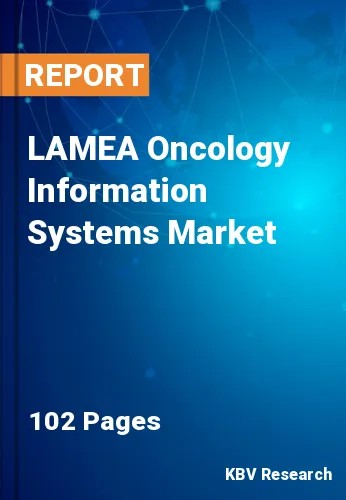The Latin America, Middle East and Africa Oncology Information Systems Market would witness market growth of 9.4% CAGR during the forecast period (2022-2028).
Oncology Information System also offers thorough and accurate information about medical and personal histories, clinical diagnoses, existing and anticipated treatment plans, and post-therapy results. These systems keep track of the different ways that patients receive anticancer care. Due to the extremely low likelihood of inconsistencies or errors coming from physical intervention, maintaining electronic records is of utmost importance.
Insufficient data, poor accessibility, unreliability, and difficulties with patient confidentiality are further problems with paper-based medical record systems. These are useless instruments for transdisciplinary patient evaluation & management data exchange and quality assurance monitoring to assure improvement. As a result, it is projected that the necessity to gradually replace paper-based records with digital records in healthcare administration will fuel the expansion of the OIS market.
United Arab Emirates (UAE) has seen an increase in noncommunicable diseases including cancer. The number of cases and fatalities have been rising in the UAE over time, despite screening and early diagnostic initiatives that appear to be far from objective coverage of the targeted respondents. The cancer control strategy for the UAE is being created with specific aims and targets in mind, following WHO and EMRO criteria. The objectives are to treat cancer, lessen its incidence, manage mortality, and improve the results and quality of life for cancer patients. Priorities also include enhancing public health education, early detection, prevention, quick diagnosis, continuity of care, facilitation of treatment, workforce training, performance appraisal, and research.
African countries' awareness of the growing health danger posed by non-communicable diseases (NCDs), such as cancer, was underlined by the Brazzaville Declaration on No communicable Diseases Control and Prevention in the WHO African Region, issued in 20112. There were several pledges among the signatories, including the creation of prevention and control plans, improving their health systems to reduce the burden of NCDs, raising money to fight these diseases, and supporting their national health information systems to collect data about NCDs and their risk factors.
The Brazil market dominated the LAMEA Oncology Information Systems Market by Country in 2021, and would continue to be a dominant market till 2028; thereby, achieving a market value of $60.9 Million by 2028. The Argentina market is experiencing a CAGR of 9.9% during (2022 - 2028). Additionally, The UAE market would exhibit a CAGR of 9.1% during (2022 - 2028).
Based on Offering, the market is segmented into Solutions (Patient Information Systems and Treatment Planning Systems) and Professional Services. Based on Application, the market is segmented into Medical Oncology, Radiation Oncology, and Surgical Oncology. Based on countries, the market is segmented into Brazil, Argentina, UAE, Saudi Arabia, South Africa, Nigeria, and Rest of LAMEA.
Free Valuable Insights: The Global Oncology Information Systems Market is Predict to reach $3.4 Billion by 2028, at a CAGR of 7.4%
The market research report covers the analysis of key stake holders of the market. Key companies profiled in the report include Oracle Corporation (Cerner Corporation), Koninklijke Philips N.V., Varian Medical Systems, Inc. (Siemens Healthineers), ViewRay, Inc., Accuray, Incorporated, Elekta AB, RaySearch Laboratories AB (Nasdaq, Inc.), Brainlab AG, DOSIsoft SA (Institut de cancérologie Gustave Roussy), and MIM Software Inc.
By Offering
By Application
By Country
Our team of dedicated experts can provide you with attractive expansion opportunities for your business.

